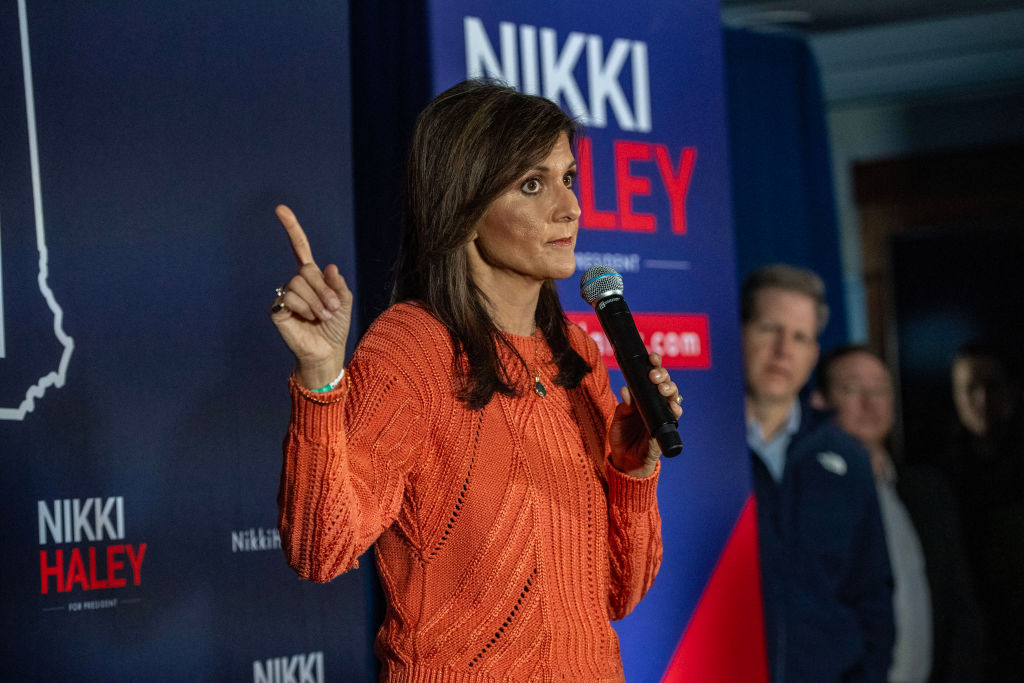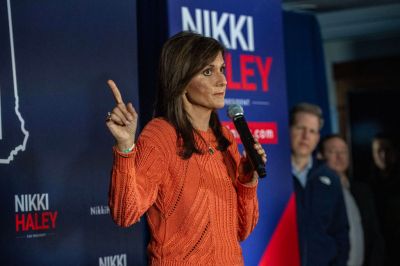RYE, New Hampshire—If Nikki Haley is going to happen anywhere in today’s New Hampshire primary, it’s going to be here.
This tony little town on the northern end of New Hampshire’s narrow Seacoast has the highest median income ($171,728 per family) in the wealthiest county in the state. Almost two-thirds of Rye’s residents have college degrees, 50 percent higher than the state as a whole.
Republican Gov. Chris Sununu won here in 2018, sandwiched between blowout losses for the GOP in the 2016 and 2020 presidential elections. This is the hometown of Judd Gregg, former governor and senator, and these are his people: fiscally conservative, socially moderate, old school New England Republicans.
These are the same kinds of voters who, just across the bridge into York County, Maine, four years ago split their tickets to go for Republican Sen. Susan Collins by 5 points while going for Joe Biden for president by 13 points.
And on this bright, brisk, busy winter afternoon the weekend before Haley’s rendezvous with history in today’s primary, you wouldn’t even know there was a campaign going on.
Asked about the Republican primary, the mother of one family carrying lunch out of a wholesomely organic cafe observed the following: “Ugh.” Her sentiments were echoed widely by others.
Just up the road in the nice neighborhoods of Portsmouth, every walk and driveway chiseled crisply out of the snow, the only political signs to be seen are for Rep. Dean Phillips, the moderate Minnesota Democrat trying to embarrass Biden in today’s contest.
Indeed, Biden put himself in a bit of a pickle here. The president wanted to “ensure that voters of color have a voice in choosing our nominee,” and he got what he wanted: The Democrats shunned the white progressive bastions of Iowa and New Hampshire, which preferred Bernie Sanders four years ago. Instead, the delegate contest will begin next month with the more ethnically diverse, moderate electorates of South Carolina, Nevada, and Michigan.
But even though there are no delegates at stake today, the primary is still taking place, as required by state law, and Phillips is here and devoting a chunk of his considerable fortune to trolling Biden, whose campaign was forced to mount a write-in campaign to prevent an embarrassing symbolic defeat.
Polls suggest it is working well, with Biden the write-in up 53 points in one recent survey. The incumbent doesn’t have to win by four dozen points to send the intended message. Holding Phillips and gadfly Marianne Williamson to a combined 30 points or so in a race where Biden’s name isn’t even on the ballot would be plenty to squelch even Republican fantasies of a “Democrats in disarray” narrative.
If Biden can flex his organizational muscles and pull a Murkowski, he will have ended up getting a boost out of a state that he risked offending by his shunning.
And that’s half of what Democrats are hoping for here today. The other half depends on Republican and Republican-leaning independents in places like Rye and the other affluent precincts of Hillsborough County. Here on the Seacoast and in the western suburbs of Manchester and Nashua—like Bedford, Sharon, Peterborough, and Hancock—Democrats want voters to do the same thing that Donald Trump needs them to do: Just skip it.
Like in Iowa, New Hampshire Republicans saw historic turnout eight years ago, with 285,916 votes cast, a 15 percent increase from 2012. The eight-way goat rodeo Republicans had here in 2016 almost matched the highest-ever turnout for any Granite State primary, the Democratic showdown of 2008.
Iowa turnout was down a precipitous 41 percent from eight years ago, but there was a blizzard and no hope of an upset, only the race for second place. Here, the forecast calls for a balmy 37 degrees and there is at least a slim chance for an upset. Very slim, but at least with Florida Gov. Ron DeSantis having self-deported, a silver medal is assured.
So maybe turnout doesn’t drop 41 percent, but maybe it goes back to something more like the 2012 numbers, when a heavily favored frontrunner walked out with a 17-point win on his way to the nomination.
A low-wattage New Hampshire contest in which dissident Republicans fold up their tents and accept the inevitability of a Trump coronation would be a mixed blessing for Trump. A bitter nomination fight can hurt a party’s chances in the general election, but so too can a fizzle. Uniting a party through victories is not the same as having a substantial minority go home empty-handed and feeling unheard. That’s the problem Biden has on the left of his party, which Trump may soon have in the middle.
If Democratic voter intensity remains high and a quarter of the Republican Party is told that they have to swallow Trump whole like Sen. Tim Scott did, it makes it hard to compete in the fall in the same suburban and affluent places where conservative and moderate Republicans tend to congregate. Haley precincts in primaries are swing precincts in the general.
In 2012, it happened the other way around. Mitt Romney won a commanding primary victory over Rick Santorum, but the working-class precincts of the GOP that favored the former Pennsylvania senator shrugged at Romney in the general election. A snoozer of a Republican contest this time could have the same effect in Haley country, which includes swing counties in swing states like New Hampshire.
What Haley is looking for, on the other hand, is something like 2016, just with fewer players in the game.
Eight years ago, Trump won New Hampshire with just 35 percent of the vote. Texas Sen. Ted Cruz finished an anemic third with 12 percent after his Iowa win. But more than half of the vote was distributed among a collection of candidates—John Kasich, Marco Rubio, Chris Christie, Carly Fiorina, and Ben Carson—who, if you put them into one Mighty Morphin Power Ranger, would roughly be Nikki Haley.
In the most recent Washington Post poll, Trump won 58 percent of those voters who described themselves as “extremely motivated,” so even the most optimistic Haley supporter can’t believe there’d be much of a decline. Indeed, one imagines that almost all of the support that went to Cruz, the proto-DeSantis, now belongs to Trump. But that’s still only about half of the vote.
In this higher turnout scenario, all those Kasich crazies, Jeb! clappers, Robots for Rubio, and the “aye, Carlys” turn out again to finally get the version of the election they were denied by the crowded field in 2016. Given the very, very specific audience for Phillips’ spoiler bid, high-propensity voters who don’t want to take the year off will be more likely to jump in on the Republican side.
Whether or not voters in places like Rye can get past “Ugh” and engage again with the GOP will pretty well determine whether the general elections starts Wednesday or if Haley can keep trying to draw on an inside straight in her home state next month.







Please note that we at The Dispatch hold ourselves, our work, and our commenters to a higher standard than other places on the internet. We welcome comments that foster genuine debate or discussion—including comments critical of us or our work—but responses that include ad hominem attacks on fellow Dispatch members or are intended to stoke fear and anger may be moderated.
With your membership, you only have the ability to comment on The Morning Dispatch articles. Consider upgrading to join the conversation everywhere.